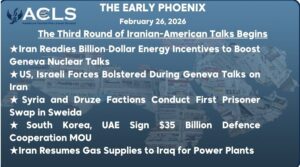THE EARLY PHOENIX
Sept 17, 2024
★ ISRAEL-HEZBOLLAH WAR
-
Israel Seeks Radical Border Security Changes Against Hezbollah Threat
Israeli Prime Minister Benjamin Netanyahu informed U.S. envoy Amos Hochstein that Israel demands a “radical change” at the Israeli-Lebanese border. The Israeli Cabinet decided to include returning the civilians to their homes in the north is now an added war objective. Mr. Hochstein argued that a wide-range war would not ensure a safe return to these people. Netanyahu in response acknowledged U.S. support but emphasized Israel’s readiness to act alone for its security. Defense Minister Yoav Galant warned both Hochstein and the U.S. Defense Secretary Lloyd Austin that the opportunity for a diplomatic solution is diminishing. Galant stressed the need to secure northern residents’ return, as Israeli forces continue fortifying positions along the Lebanon border. Maj. Gen. Ori Gordin is pushing for a ground incursion into southern Lebanon to create a buffer zone and stop Hezbollah’s attacks on northern Israel.
-
Hezbollah Refuses Calm in Lebanon During Gaza Conflict
Hezbollah has rejected any potential calm in Lebanon despite the possibility of electing a new president, asserting that the Gaza conflict remains central. Western diplomats have speculated that resolving Lebanon’s presidential crisis could stabilize the south, but Hezbollah insists it will not separate the situation in Gaza from Lebanon. Speaker of Parliament Nabih Berri expressed flexibility regarding the presidential election process but maintained support for Suleiman Franjieh. Meanwhile, political sources see no imminent breakthroughs in Lebanon’s internal political and electoral challenges.
-
Israeli Airstrikes Hit Southern Lebanon After Hezbollah Rocket Attacks
Israeli Defense Forces (IDF) conducted airstrikes in southern Lebanon, targeting multiple locations. Fighter jets struck a building near a mosque in Hula, resulting in one reported fatality and two injuries according to unofficial Lebanese sources. Further strikes were carried out in Tayr Harfa, al-Odaisseh, Blida, and Kafr Shuba. Hezbollah launched rockets at Israeli artillery positions in Zaoura at 1430 hours, with direct hits reported. On Monday, Hezbollah fired 45 rockets towards Kiryat Shmona, Galilee, and northern Golan Heights, some intercepted by defense systems while others caused fires in open areas. Additionally, four Hezbollah drones entered Israeli airspace, leading to minor injuries. IDF responded to rocket fire with airstrikes across southern Lebanon. The IDF continues to monitor airspace and has closed schools in Majdal Shams as a precautionary measure following regional alarms.
=======
★ ISRAEL & PALESTINIAN TERRITORIES
-
Netanyahu May Replace Gallant, Sparking Economic and Political Concerns
Rumors suggest Prime Minister Netanyahu may replace Defense Minister Gallant and bring in Gideon Saar’s party to boost his Knesset majority. Police Minister Itamar Ben Gvir, a key ultranationalist figure, has called for Gallant’s dismissal, citing Gallant’s handling of escalating tensions with Hezbollah in the north. Centrist lawmakers criticized Netanyahu for prioritizing political maneuvers over national security. The announcement led to a 1% drop in the shekel and declines in Tel Aviv’s stock market, with indices falling between 1.4% and 1.6%. Economic concerns grew after inflation rose to 3.6% in August, potentially delaying rate cuts until 2025.
-
Sinwar’s Secret Communications vs. Israeli Intelligence Capabilities
Yahia Sinwar sent an unsigned, handwritten letter to Houthi leader Abdul-Malik al-Houthi, praising their missile strike on central Israel. Sinwar also affirmed his readiness for a prolonged war against Israel, supported by regional allies aligned with Iran. His methods of communication gained attention, with experts attributing his survival to these tactics. Sinwar uses handwritten notes, messengers, and codes developed during his imprisonment in Israel. These encrypted messages pass through trusted intermediaries, reaching Arab mediators or Hamas operatives abroad. Arabic media also discussed Israel’s intelligence efforts in monitoring Sinwar’s communications.
-
Israeli Airstrikes in Gaza Continue as Death Toll Discrepancy Grows
Israeli airstrikes have targeted the Nuseirat refugee camp, Zeitoun neighborhood, and Rafah. The Israeli military also redeployed its 5th Brigade to the Netzarim Corridor in central Gaza, months after it had left the region. Israel claims it has killed 17,000 combatants since the war with Hamas began in October 2023, following Hamas’s attack on southern Israel. In addition, Israel reports killing 1,000 terrorists inside its borders. Meanwhile, Hamas authorities report that the death toll in Gaza has reached 41,226, an increase from the previous day.
-
Israel Raids West Bank Cities, Clashes Erupt in Balata Camp
Israeli forces raided several West Bank cities, including Nablus and Balata camp, on Sunday evening, sparking armed clashes. Resistance groups from Hamas, Islamic Jihad, and Fatah claimed responsibility for confronting Israeli forces with gunfire and explosives. Similar raids occurred in Ramallah, Bethlehem, and Qalqilya, where Israeli forces used tear gas and stun grenades.
-
Germany Reportedly Enforces Quiet Arms Embargo on Israel
Germany has refused Israel’s requests for arms, while approving a 100-million-euro weapons deal with Qatar, according to Bild. Israel sought to purchase thousands of tank shells from Germany last year, but received no response. The report suggests a quiet arms embargo is in place. Bild emphasized that military procurement abroad is crucial for Israel as it battles Hamas and Hezbollah on multiple fronts.
=======
★ IRAN
-
Iran’s Missile Claims Spark Global Skepticism Over Credibility
Iranian President Massoud Bezoushkian recently denied supplying hypersonic missiles to Houthi rebels in Yemen, a claim that experts like Dr. Hassan Hashimian have challenged. Hashimian pointed out that only the U.S., China, and Russia possess such technology, and Iran did not have it as of 2023, casting doubt on the President’s assertion that the Houthis independently developed this capability. Hashimian also criticized Bezoushkian’s portrayal of U.S.-Iran relations as non-hostile, highlighting Iran’s role in the 1979 U.S. Embassy seizure and the continued teaching of anti-American slogans in schools. Critics argue these contradictions undermine Iran’s credibility on the global stage. Meanwhile, Iranian Foreign Minister Abbas Araghchi reaffirmed Tehran’s “unlimited” support for Hamas militants while emphasizing Iran’s desire to avoid direct conflict. He dismissed European sanctions as ineffective and urged dialogue, despite concerns over Iran’s supply of drones and missiles to Russia.
-
Iran Ready to Revive 2015 Nuclear Deal Without Relying on US Involvement
Tehran expressed readiness to revive the 2015 nuclear deal, signaling it will proceed without waiting for U.S. involvement. Iran’s Foreign Minister Abbas Araghchi confirmed Iran will engage with European nations independently, moving forward with the nuclear agreement. Araghchi stressed Tehran will not accept any deal unless Iran’s national interests are fully protected during negotiations. He highlighted that discussions with the U.S. would continue, but only under specific conditions beneficial to Iran. Araghchi acknowledged that serious negotiations with the U.S. are unlikely during the upcoming U.S. presidential election season.
-
UK to Ban Company Linked to Iranian Oil Smuggling Operations
The UK government is cracking down on Iran’s oil smuggling operations, targeting companies led by Hossein Shamkhani, son of a top advisor. Shamkhani’s business network is scrutinized for helping transport Iranian and Russian oil worldwide, according to Bloomberg sources. On September 3, Companies House announced “Nest Wise Trading Ltd,” based in London, will be dissolved if compliance requirements aren’t met. This decision follows investigations showing Shamkhani as the company’s ultimate beneficial owner, according to insiders familiar with UK deliberations. The action is part of coordinated US-UK efforts to target entities circumventing oil-related sanctions and international trade restrictions.
=======
★ SYRIA
-
US-Led Coalition Thwarts Drone Attack on Syrian Base
The US-led coalition intercepted three suicide drones targeting Khirab al-Jir base in northeastern Hasakah, Syria, on Sunday, according to local sources. Coalition air defenses successfully neutralized the threat, preventing any damage or casualties. “Murasel al-Sharqiya” reported that the drones were downed before reaching the base, while the “Al-Khabour” network noted explosions in the area after the coalition deployed a thermal balloon to monitor Iranian militia movements. The incident underscores the ongoing regional tensions involving US and coalition forces and the persistent threat posed by hostile actors in the region.
-
Unauthorized Oil Production in Syria’s Block 26 Resumes
British firm Gulf Sands revealed that unauthorized entities have resumed oil production in Syria’s Block 26, which has been under force majeure since 2011. The total value of hydrocarbons taken since 2017 exceeds $14 billion, benefiting illicit groups backed by international actors. Gulf Sands, which signed a 2003 oil exploration deal with China’s Sinochem and Syria’s government, has been unable to operate due to British sanctions. The illegal production has worsened the economic devastation and environmental damage in northeastern Syria, further impacting the Syrian population.
-
Sergei Shoigu Visits Assad To Discuss Security
Bashar al-Assad met with Russian Security Council Secretary Sergei Shoigu in Damascus to discuss international and regional security matters. Pro-regime media reported that Assad emphasized the strength of Syrian-Russian relations, despite challenges in recent years. The Syrian Presidency confirmed the meeting focused on enhancing bilateral cooperation between the two countries, though details were limited. This follows a prior meeting between Assad and Russian President Vladimir Putin in Moscow on July 25, where escalating tensions in the Middle East, including Syria, were discussed.
=======
★ YEMEN
-
Houthis Make Unverified Claims About Drone and US Negotiations
Houthi forces claimed to have downed a U.S. MQ-9 drone near Sana’a using a locally-made missile, though CENTCOM has not confirmed this. This is the third such unverified claim by the Houthis in a week. Later, a senior Houthi leader alleged the U.S. offered to recognize their government in exchange for halting maritime attacks, a statement that a U.S. official called “total fabrication.” The U.S. State Department also dismissed it as propaganda. The Houthis, who have launched over 220 projectiles at Israel in support of Gaza, continue to attack ships linked to Israel, fueling tensions in the region.
-
Internal Conflicts Among Houthi Leaders Escalate Over Corruption
Tensions within the Houthi leadership are rising as internal conflicts intensify following accusations of widespread corruption. After announcing their unrecognized government, Houthi leaders have exchanged serious allegations, with activists claiming corruption involving the judiciary. The “Teachers Club” also reported the looting of funds meant for school teachers across Yemen. Ahmed Hamid, the Houthi Office Director, publicly criticized several high-ranking officials within the group. These internal disputes highlight growing challenges to the Houthi government’s efforts to maintain unity and credibility.
======
★ EGYPT & AFRICA
16. Blinken to Meet Egyptian Officials for Gaza Ceasefire Talks
US Secretary of State Antony Blinken will visit Egypt this week to discuss efforts to reach a ceasefire in Gaza. The talks will focus on securing the release of prisoners, easing the humanitarian crisis in Gaza, and establishing broader regional security. Egypt plays a crucial role in ongoing mediation efforts alongside the US and Qatar. Blinken will also co-chair the US-Egyptian strategic dialogue with Egyptian officials, aiming to deepen bilateral relations and promote economic and cultural development. The visit is scheduled from Tuesday to Thursday.
-
Israel Spots Ballistic Missile Launchers in Egypt’s Sinai Mountains
Satellite images reveal Egypt is building medium- and long-range ballistic missile launch sites in Sinai. According to the “Jewish Press,” Egypt’s targets are likely Ethiopia, due to Nile dam control, and the Houthis, who have disrupted Red Sea shipping. Egypt’s interest in ballistic missiles dates back to the 1960s, with the successful test of the “Al-Qaher” missile in 1962, although it wasn’t used in the 1967 Six-Day War.
========
★ TURKIYE
-
Turkiye Files Charges Against 20 For Espionage On Mossad
The Istanbul prosecutor has filed charges against 20 individuals for espionage on behalf of the Israeli Mossad. Sixteen of the suspects are currently in custody. They allegedly gathered confidential information on Palestinians and Hamas members in Turkey and shared it with Israeli intelligence. The suspects received payments through bank transfers, cryptocurrency, and Western Union. The prosecution is seeking prison terms ranging from 18 to 45 years. Court hearings for the accused are scheduled to begin in November.
======
★ IRAQ
-
Iraqi Oil Exports Decline Sharply In First Quarter Of 2024
Iraq’s Central Bank reported a 15.7% drop in total exports during Q1 2024, amounting to $23.474 billion. Oil, which accounted for 96.7% of total exports, saw a 16.4% decline compared to Q4 2023 due to a 10.7% decrease in global oil prices.
========
★ GULF NATIONS
-
Saudi-Egypt Trade Reaches $33 Billion Over Two Years
Saudi Investment Minister Khalid Al-Falih announced that trade between Saudi Arabia and Egypt surpassed $33 billion during 2022 and 2023. He emphasized the importance of economic cooperation, noting that Egypt attracts Saudi investments in tourism, infrastructure, real estate, agriculture, and energy. Al-Falih also highlighted the growing role of Egyptian investors in Saudi Arabia, with investment licenses increasing by 100% in 2024 and over 80,000 jobs created for Egyptians in the Saudi economy.
-
Gulf Sukuk Achieve Gains Ignoring Oil Price Decline
Gulf Sukuk achieved the longest weekly gains streak since February 2021, with the Bloomberg index recording gains for the eleventh consecutive week and reaching its highest level. Sukuk rose by 3.9% despite oil and gas prices dropping by more than 17%. With the U.S. Federal Reserve’s decision approaching, markets are preparing for a drop in yields due to the expected interest rate cuts, boosting risk appetite and driving investors to purchase assets in emerging markets.
-
Qatar-China Trade Reaches 87 Billion Riyals in 2023
Qatar’s trade volume with China reached 87 billion riyals in 2023, doubling from 42.7 billion riyals in 2020, strengthening their economic ties. Both countries discussed expanding business partnerships in sectors like industry, services, and tourism during a meeting hosted by Qatar’s Chamber of Commerce and China’s trade council. Chinese companies were encouraged to explore Qatar’s investment opportunities, while both nations aim to enhance private sector collaboration and long-term investments across various industries.
-
Saipem Wins $4 Billion Contract from QatarEnergy
Saipem, the Italian energy group, secured a $4 billion contract from QatarEnergy to boost production from its offshore gas field. Qatar plans to expand North Field production to 142 million tons annually by 2030, up from 77 million tons currently. Additionally, Saipem recently won two offshore contracts in Saudi Arabia, worth nearly $1 billion, as part of a long-term agreement with Saudi Aramco. These deals strengthen Saipem’s role in the Middle East’s growing energy sector.
-
Qatar’s Industrial Production Index Declines by 4% in July 2024
Qatar’s Industrial Production Index dropped 4% in July 2024 to 103.2 points, driven by a 5% decline in mining and quarrying, especially crude oil and natural gas extraction. Manufacturing also fell by 0.3%, mainly due to a 16.6% drop in basic metals production. However, electricity, gas, and steam supply increased by 8.2%, and water supply rose by 0.5%. Despite these declines, the index grew 6% on a monthly basis, reflecting sectoral variations.
=====
Important Related Editions:
Sept 9, 2024 Egypt Agrees to Temporary Israeli Presence After Economic Growth
Sept 16, 2024 Russia Transfers Nuclear Secrets to Iran For Missiles



